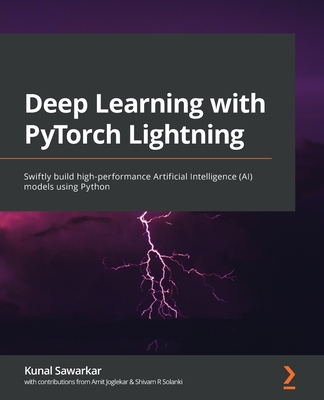Deep Learning Systems: Algorithms, Compilers, and Processors for Large-Scale Production
暫譯: 深度學習系統:大規模生產的演算法、編譯器與處理器
Rodriguez, Andres
- 出版商: Morgan & Claypool
- 出版日期: 2020-10-26
- 售價: $2,560
- 貴賓價: 9.5 折 $2,432
- 語言: 英文
- 頁數: 265
- 裝訂: Quality Paper - also called trade paper
- ISBN: 1681739666
- ISBN-13: 9781681739663
-
相關分類:
DeepLearning、Algorithms-data-structures、Compiler
海外代購書籍(需單獨結帳)
買這商品的人也買了...
-
 Digital Communications: Design for the Real World (Paperback)
Digital Communications: Design for the Real World (Paperback)$980$960 -
 Fundamentals of Power Electronics, 2/e (Hardcover)
Fundamentals of Power Electronics, 2/e (Hardcover)$1,250$1,225 -
 CMOS Digital Integrated Circuits Analysis & Design, 4/e (IE-Paperback)
CMOS Digital Integrated Circuits Analysis & Design, 4/e (IE-Paperback)$1,200$1,176 -
 $352機器視覺算法與應用 (雙語版)
$352機器視覺算法與應用 (雙語版) -
 深入理解計算機系統, 3/e (Computer Systems: A Programmer's Perspective, 3/e)
深入理解計算機系統, 3/e (Computer Systems: A Programmer's Perspective, 3/e)$834$792 -
 $356算法圖解 (Grokking Algorithms: An illustrated guide for programmers and other curious people)
$356算法圖解 (Grokking Algorithms: An illustrated guide for programmers and other curious people) -
 人工智能算法 捲1 基礎算法
人工智能算法 捲1 基礎算法$354$336 -
 $224深度學習:從入門到精通 (微課版)
$224深度學習:從入門到精通 (微課版) -
 認識人工智慧-第四波工業革命
認識人工智慧-第四波工業革命$420$378 -
 $607機器學習導論
$607機器學習導論 -
 $203實戰深度學習——原理、框架及應用
$203實戰深度學習——原理、框架及應用 -
 人工智慧:8堂一點就通的基礎活用課
人工智慧:8堂一點就通的基礎活用課$380$296 -
 $215機器學習公式詳解
$215機器學習公式詳解 -
 最踏實 AI 之路:全白話機器學習一次搞懂
最踏實 AI 之路:全白話機器學習一次搞懂$780$663 -
 $458人工智能算法 捲3 深度學習和神經網絡
$458人工智能算法 捲3 深度學習和神經網絡 -
 原來AI這麼簡單!:熟練機器學習5大步驟,就算不會寫程式,也能成為AI高手
原來AI這麼簡單!:熟練機器學習5大步驟,就算不會寫程式,也能成為AI高手$300$255 -
 光電子技術, 5/e
光電子技術, 5/e$375$356 -
 Learning Deep Learning: Theory and Practice of Neural Networks, Computer Vision, Nlp, and Transformers Using Tensorflow (Paperback)
Learning Deep Learning: Theory and Practice of Neural Networks, Computer Vision, Nlp, and Transformers Using Tensorflow (Paperback)$2,890$2,746 -
 $908高速數字接口與光電測試
$908高速數字接口與光電測試 -
 三維微電子封裝:從架構到應用, 2/e (3D Microelectronic Packaging: From Architectures to Applications, 2/e)
三維微電子封裝:從架構到應用, 2/e (3D Microelectronic Packaging: From Architectures to Applications, 2/e)$1,320$1,254 -
 $505硅基光電子集成技術 — 光波導放大器和激光器
$505硅基光電子集成技術 — 光波導放大器和激光器 -
 $403一本書讀懂 AIGC:ChatGPT、AI繪畫、智能文明與生產力變革
$403一本書讀懂 AIGC:ChatGPT、AI繪畫、智能文明與生產力變革 -
 $556大規模語言模型:從理論到實踐
$556大規模語言模型:從理論到實踐 -
 RISC-V 開放架構設計之道
RISC-V 開放架構設計之道$534$507 -
 跟 NVIDIA 學深度學習!從基本神經網路到 ......、GPT、BERT...,紮穩機器視覺與大型語言模型 (LLM) 的建模基礎
跟 NVIDIA 學深度學習!從基本神經網路到 ......、GPT、BERT...,紮穩機器視覺與大型語言模型 (LLM) 的建模基礎$880$695
商品描述
This book describes deep learning systems: the algorithms, compilers, and processor components to efficiently train and deploy deep learning models for commercial applications.
The exponential growth in computational power is slowing at a time when the amount of compute consumed by state-of-the-art deep learning (DL) workloads is rapidly growing. Model size, serving latency, and power constraints are a significant challenge in the deployment of DL models for many applications. Therefore, it is imperative to codesign algorithms, compilers, and hardware to accelerate advances in this field with holistic system-level and algorithm solutions that improve performance, power, and efficiency.
Advancing DL systems generally involves three types of engineers: (1) data scientists that utilize and develop DL algorithms in partnership with domain experts, such as medical, economic, or climate scientists; (2) hardware designers that develop specialized hardware to accelerate the components in the DL models; and (3) performance and compiler engineers that optimize software to run more efficiently on a given hardware. Hardware engineers should be aware of the characteristics and components of production and academic models likely to be adopted by industry to guide design decisions impacting future hardware. Data scientists should be aware of deployment platform constraints when designing models. Performance engineers should support optimizations across diverse models, libraries, and hardware targets.
The purpose of this book is to provide a solid understanding of (1) the design, training, and applications of DL algorithms in industry; (2) the compiler techniques to map deep learning code to hardware targets; and (3) the critical hardware features that accelerate DL systems. This book aims to facilitate co-innovation for the advancement of DL systems. It is written for engineers working in one or more of these areas who seek to understand the entire system stack in order to better collaborate with engineers working in other parts of the system stack.
The book details advancements and adoption of DL models in industry, explains the training and deployment process, describes the essential hardware architectural features needed for today's and future models, and details advances in DL compilers to efficiently execute algorithms across various hardware targets.
Unique in this book is the holistic exposition of the entire DL system stack, the emphasis on commercial applications, and the practical techniques to design models and accelerate their performance. The author is fortunate to work with hardware, software, data scientist, and research teams across many high-technology companies with hyperscale data centers. These companies employ many of the examples and methods provided throughout the book.
商品描述(中文翻譯)
本書描述了深度學習系統:用於有效訓練和部署商業應用的演算法、編譯器和處理器元件。
在當前最先進的深度學習(DL)工作負載快速增長的時期,計算能力的指數增長正在放緩。模型大小、服務延遲和功耗限制在許多應用中對DL模型的部署構成了重大挑戰。因此,必須共同設計演算法、編譯器和硬體,以加速該領域的進展,並通過整體系統級和演算法解決方案來改善性能、功率和效率。
推進DL系統通常涉及三類工程師:(1)數據科學家,他們與領域專家(如醫學、經濟或氣候科學家)合作,利用和開發DL演算法;(2)硬體設計師,他們開發專用硬體以加速DL模型中的元件;(3)性能和編譯器工程師,他們優化軟體以在特定硬體上更高效地運行。硬體工程師應了解生產和學術模型的特徵和元件,這些模型可能會被業界採用,以指導影響未來硬體的設計決策。數據科學家在設計模型時應考慮部署平台的限制。性能工程師應支持在不同模型、庫和硬體目標之間的優化。
本書的目的是提供對(1)行業中DL演算法的設計、訓練和應用的深入理解;(2)將深度學習代碼映射到硬體目標的編譯器技術;以及(3)加速DL系統的關鍵硬體特徵的理解。本書旨在促進DL系統的共同創新。它是為在這些領域工作並希望了解整個系統堆疊的工程師而寫的,以便更好地與在系統堆疊其他部分工作的工程師協作。
本書詳細介紹了DL模型在行業中的進展和採用,解釋了訓練和部署過程,描述了當前和未來模型所需的基本硬體架構特徵,並詳細說明了DL編譯器在各種硬體目標上高效執行演算法的進展。
本書的獨特之處在於對整個DL系統堆疊的整體性闡述,強調商業應用,以及設計模型和加速其性能的實用技術。作者有幸與許多擁有超大規模數據中心的高科技公司中的硬體、軟體、數據科學家和研究團隊合作。這些公司在全書中提供了許多示例和方法。











